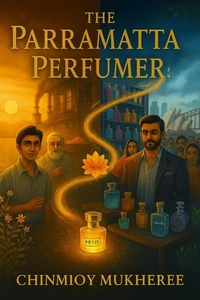"Don't Call Me Goobe" is a satirical novella by Chinmoy Mukherjee that chronicles the harrowing 30-day odyssey of Chunmun Singh, a young migrant from flood-ravaged Motihari in Bihar, who arrives in Bengaluru filled with dreams of prosperity in India's Silicon Valley. Fleeing poverty and natural disasters, Chunmun envisions a city of gleaming skyscrapers and steady jobs, but instead encounters a relentless barrage of xenophobia, linguistic barriers, and cultural clashes.
From his first day, he faces hostility as an "outsider" from the North, with each chapter detailing a new encounter where minor misunderstandings-such as speaking Hindi, mispronouncing Kannada, or simply existing in public spaces-escalate into physical assaults by locals from all walks of life, including bus conductors, auto drivers, shopkeepers, colleagues, and even activists. Through a series of darkly comic and increasingly absurd incidents, the story exposes the deep-seated resentments in Bengaluru toward North Indian migrants, who are blamed for everything from job theft and rising rents to cultural erosion and urban decay.
Chunmun's attempts to adapt, like buying a Kannada phrasebook or maintaining silence, only backfire, turning compliments into flirtation fiascos, job interviews into rejections, and peaceful moments in parks or temples into violent expulsions. The novella paints a vivid portrait of the city's vibrant chaos-its scents of jasmine and exhaust, colors of saris and billboards, and sounds of multilingual cacophony-while highlighting the vicious cycle of mutual prejudice between locals and migrants, fueled by economic pressures and identity politics.
Ultimately, after enduring 30 beatings that culminate in a final, insignificant shove at the railway station, a broken Chunmun returns to Bihar, his Technicolor dreams shattered. Back in his village, amid the familiar monsoons and family embraces, he finds a bittersweet sense of belonging in the shared hardships of home. The novella concludes as a poignant commentary on India's fractious unity, where migration promises opportunity but often delivers alienation, and true stability lies not in urban ambition but in rooted resilience.
"Don't Call Me Goobe" is a satirical novella by Chinmoy Mukherjee that chronicles the harrowing 30-day odyssey of Chunmun Singh, a young migrant from flood-ravaged Motihari in Bihar, who arrives in Bengaluru filled with dreams of prosperity in India's Silicon Valley. Fleeing poverty and natural disasters, Chunmun envisions a city of gleaming skyscrapers and steady jobs, but instead encounters a relentless barrage of xenophobia, linguistic barriers, and cultural clashes.
From his first day, he faces hostility as an "outsider" from the North, with each chapter detailing a new encounter where minor misunderstandings-such as speaking Hindi, mispronouncing Kannada, or simply existing in public spaces-escalate into physical assaults by locals from all walks of life, including bus conductors, auto drivers, shopkeepers, colleagues, and even activists. Through a series of darkly comic and increasingly absurd incidents, the story exposes the deep-seated resentments in Bengaluru toward North Indian migrants, who are blamed for everything from job theft and rising rents to cultural erosion and urban decay.
Chunmun's attempts to adapt, like buying a Kannada phrasebook or maintaining silence, only backfire, turning compliments into flirtation fiascos, job interviews into rejections, and peaceful moments in parks or temples into violent expulsions. The novella paints a vivid portrait of the city's vibrant chaos-its scents of jasmine and exhaust, colors of saris and billboards, and sounds of multilingual cacophony-while highlighting the vicious cycle of mutual prejudice between locals and migrants, fueled by economic pressures and identity politics.
Ultimately, after enduring 30 beatings that culminate in a final, insignificant shove at the railway station, a broken Chunmun returns to Bihar, his Technicolor dreams shattered. Back in his village, amid the familiar monsoons and family embraces, he finds a bittersweet sense of belonging in the shared hardships of home. The novella concludes as a poignant commentary on India's fractious unity, where migration promises opportunity but often delivers alienation, and true stability lies not in urban ambition but in rooted resilience.

 , qui est-ce ?
, qui est-ce ?